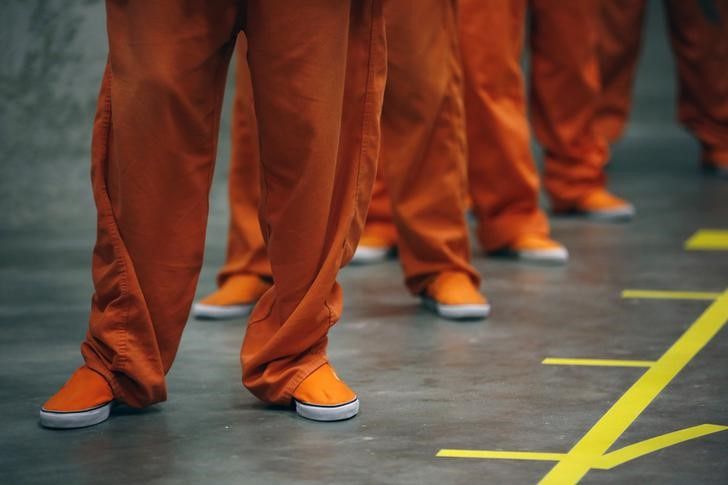Sept 27 (Reuters) – The worst miscarriages of justice any system can produce – the conviction or death sentence of an innocent person – are largely driven by racism in the U.S., a new report by the National Registry of Exonerations shows.
The Race and Wrongful Convictions report released on Tuesday also identifies some striking trends in the data about false convictions, including that pre-trial DNA testing has prevented the conviction of hundreds, maybe thousands, of innocent rape suspects, mostly Black men accused of raping white women.
Advertisement · Scroll to continue
The Registry, a joint project of the University of California, Irvine, the University of Michigan Law School and Michigan State University College of Law, tracks all known wrongful convictions in the U.S. since 1989. It last reported race and exonerations in 2017, when there were 1,900 known cases. That count has ballooned by almost 70% in the five years since, now reaching an astonishing 3,249 innocent people falsely convicted, and who served nearly 12 years in prison on average. That number doesn’t include tens of thousands of people cleared in “group exonerations” because of large-scale law enforcement corruption (Information is sometimes sparse in those cases, and many don’t fit the researchers’ definition of “exoneration,” which includes new evidence of innocence.).
The Registry’s Race and Wrongful Convictions report is based on the first 3,200 exonerees in the registry, most of whom either faced the most serious, life-altering accusations – murder and sexual assault — or were targeted and swept up in our Sisyphean war on drugs.
The growing number of exonerations makes the trends in the data more reliable, and the racial patterns are clear, and damning. They implicate offices and individuals at all levels of the justice system, from police, to drug lab technicians, to coroners, prosecutors and judges.
Advertisement · Scroll to continue
More than half of the people convicted of crimes and later exonerated because they were innocent are Black — 53% — even though Black people make up 13.6% of the American population, according to the report. (Researchers note that there are serious limitation to studying false convictions of Latino, Native American and other minority defendants, largely due to missing data or inconsistent standards of racial categorization.).
In other words, Black people are overrepresented in wrongful convictions at a rate nearly four times their proportion of the population. That holds true, to varying degrees, for exonerations in all major crime categories except white collar crime, and the racial disparities persist no matter how one slices the data.
A spokesperson at the National District Attorneys Association didn’t respond to a request for comment about the study. The Fraternal Order of Police also didn’t respond to my questions for this column.
Christina Swarns, executive director of the Innocence Project, told me that the report “shows that the belief that race is a proxy for criminality continues to pervade the criminal legal system and is a powerful driver of wrongful convictions.”
The largest racial disparities show up for drug crimes, largely because of a key feature that distinguishes them from murder or rape cases: Police officers themselves choose whom to search, investigate and arrest for drug offenses.
“They usually choose Black people,” researchers wrote.
Sixty-nine percent of drug crime exonerees are Black and 16% are white, even though Black and white Americans use illegal drugs at similar rates, according to the report. Put differently, innocent Black people are about 19 times more likely to be falsely convicted of drug crimes than innocent white people.
The report counts some 2,975 drug exonerations, many caused by police officers who deliberately and systematically framed Black people, including by planting drugs. (This count includes some defendants in “group exonerations.”) A number of those scandals involved specialized drug task forces that have a documented history of aggressive policing and systemic abuse.
The disparities are lower, but still unmistakable, in more serious crime categories.
Innocent Black people are 7.5. times more likely to be convicted of murder than innocent white people, according to the report.
They’re more likely to be framed in those cases: Murder exonerations of Black people were almost 50% more likely to include police misconduct than those of white defendants. And the disparity is also tied to the race of the victim. Many studies in at least 15 states have showed that defendants of all color who are charged with killing white victims are more likely to be sentenced to death than those charged with killing Black victims, the researchers wrote.
Innocent Black people are also nearly eight times more likely to be falsely convicted of rape than innocent white people. “The major cause of this disturbing racial disparity is the high danger of misidentification of Black suspects by white victims,” according to the report.
But mistakes don’t tell the whole story. A “substantial number of the convictions that led to rape exonerations of Black defendants were marred by implicit biases, racially tainted official misconduct and, in some cases, explicit racism,” researchers wrote.
Two interesting trends also emerged in the data about violent crimes, and they speak to improvements in how we handle false convictions.
First, exonerations of misidentified rape defendants are now rare because of DNA testing – there were only two in the last 12 years. Second, many recent murder exonerees are Black people who were cleared by just eight conviction integrity units in large cities, including Philadelphia, Chicago and Detroit.
Swarns said that DNA testing has had a “huge impact on disparities in the system.” The data on exonerations, overall, make it “abundantly clear” that all prosecutors should have units dedicated to reviewing questionable convictions, she added.
Register now for FREE unlimited access to Reuters.com
Our Standards: The Thomson Reuters Trust Principles.
Opinions expressed are those of the author. They do not reflect the views of Reuters News, which, under the Trust Principles, is committed to integrity, independence, and freedom from bias.
Thomson Reuters
Hassan Kanu writes about access to justice, race, and equality under law. Kanu, who was born in Sierra Leone and grew up in Silver Spring, Maryland, worked in public interest law after graduating from Duke University School of Law. After that, he spent five years reporting on mostly employment law. He lives in Washington, D.C. Reach Kanu at hassan.kanu@thomsonreuters.com




